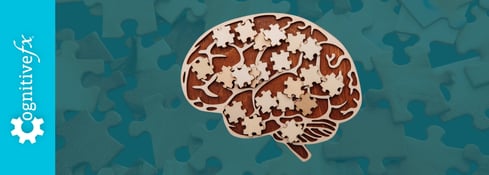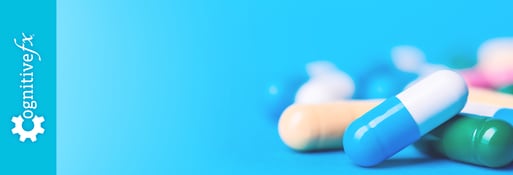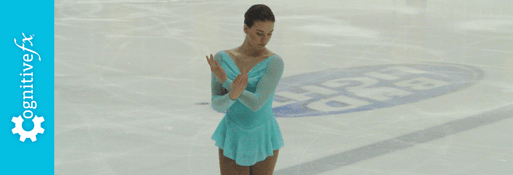Long-Term Concussion Effects, Treatment & More

Concussions can have long-term physical, cognitive, and emotional effects. Symptoms such as brain fog, headaches, and depression can last for months or years after the initial injury. When the effects of a concussion last for three months or more, we call it post-concussion syndrome (PCS).
Not everyone who suffers from these long-term symptoms immediately realizes their connection to concussion. Many of our patients describe frustrating experiences in their search for recovery…
- Post-concussion medications that made their symptoms worse instead of better
- Healthcare providers who were dismissive and uncaring (One doctor told Myrthe van Boon that she “just liked to be taken care of” — but Myrthe was vindicated when she saw her brain scan results at our clinic.)
- Family members who didn’t understand or know how to help (Here’s a resource on how family members and friends can help TBI patients.)
- Treatment programs that failed to help (Read how Sam Pembleton tried every concussion clinic she could find before receiving successful treatment at Cognitive FX.)
- And so on.
The good news is that recovering from post-concussion syndrome is possible. At Cognitive FX, patients from around the world find relief from persistent post-concussion symptoms. Our team employs a combination of cardiovascular exercise and multidisciplinary therapies to promote healing in the brain. We’ve had patients who experienced their head injury (or injuries) decades before they started treatment and who still experienced improvements after their time with us.
For example, Sam Gray came to Cognitive FX 33 years after a serious head trauma. He told us that after treatment, he felt like he finally woke up from a dream. “I didn't go out and advertise that I was having horrible problems, but people see the change in me. They ask, ‘What happened to you?’ and ‘Was it worth it?’ And I tell them, not only was it worth it, but I would pay ten times what they charge,” he said. Treatment “changes your life,” he added.
In this article, we’ll discuss:
- The most common long-term effects after a concussion
- What causes these long-term effects
- How to treat persistent concussion symptoms
- Answers to frequently asked questions (FAQ)
If you’re experiencing persistent symptoms such as brain fog, fatigue, memory problems, vision changes, and more, months or years after a concussion, you’re not crazy. These are real symptoms caused by changes in the brain and autonomic system, and they can be helped. Over 90% of our patients experience significant recovery after treatment in our clinic. To determine if our program is right for you, please schedule a consultation with our team.
The Long-Term Effects of Concussions

The majority of people who sustain a mild traumatic brain injury and/or whiplash recover within three months of the injury. However, almost 50% of patients with a concussion still show symptoms of brain injury six months later, and 15 - 30% of patients report persistent symptoms for at least 12 months after the original injury. These symptoms often reduce quality of life and affect how the patient can carry out their daily activities at school or work.
These patients can experience a wide range of long-term symptoms after a mild TBI, depending on what areas of the brain were affected by the concussion. Symptoms are not always immediately apparent after the injury; some may take months or even years to develop.
Some of these symptoms can significantly impact the patient’s quality of life and make it difficult to perform daily activities. For example, a patient with light sensitivity and dizziness might develop nausea and headaches as they attempt to navigate their day in spite of the first two. The combination can be crippling.
Some of the most common long-term effects of a concussion include:
Post-traumatic Headaches
Headaches are one of the most disabling long-term symptoms of a concussion. Patients can experience different types of headaches, including tension headaches, cervical headaches (often accompanied by neck and back pain), and migraines.
Further reading: Post-concussion headaches and post-concussion neck pain
Cognitive Impairments
Concussions commonly cause long-term cognitive deficits, such as brain fog, memory loss, difficulty processing information and concentrating, and poor reasoning and problem-solving skills.
Further reading: Cognitive exercises for PCS
Vision Problems
Visual symptoms are also a frequent side effect of concussions, affecting up to 80% of patients. Common eye problems include blurred or double vision, eye pain, abnormal eye movements, light sensitivity, rapid eye movement, and more.
Further reading: Post-trauma vision syndrome treatment
Vestibular Symptoms
Up to 70% of concussion patients experience vestibular dysfunction — a disturbance in the balance system of the body. Symptoms include dizziness, vertigo, imbalance, nausea, and unsteady gait.
Further reading: Dizziness after concussion
Fatigue
Post-traumatic fatigue could present as fatigue that comes and goes with cognitive exertion or constant exhaustion, both physical and mental, which does not improve even after rest or sleep. It affects up to 70% of PCS patients.
Further reading: PCS and fatigue
Sleep Disorders
Sleeping disorders such as difficulty sleeping (insomnia) or sleeping too much (hypersomnia) may also occur after a concussion. Sleep issues can aggravate other consequences of the injury, affect mood, increase pain, and lower cognitive abilities.
Further reading: PCS and sleep
Behavioral Issues
Concussions can cause extreme mood swings and lead to feelings of anger, aggression, frustration, and other emotional problems. These symptoms can heighten other problems, such as headaches, dizziness, tiredness, problems sleeping, and memory problems, and they can also delay recovery.
Further reading: “Personality” changes after head injury
Depression and Anxiety
In the long term, concussions can also trigger feelings of depression and anxiety, with over 30% of patients affected by depression during the first year after injury. Some signs of depression may include constant fatigue, weight loss or gain, irritability, lack of interest in activities that used to interest you, and feeling hopeless.
Further reading: Depression after a concussion
Here’s a more complete list of symptoms that may persist for months or years after a concussion:
| Emotional | Cognitive | Physical |
| Anxiety | Brain fog | Blood pressure changes |
| Depression | Difficulty concentrating | Change in (or loss of) taste or smell |
| Feeling overwhelmed | Difficulty finding things | Difficulty balancing |
| Impulsiveness | Difficulty reading | Dizziness or vertigo |
| Irritability | Getting lost | Exaggerated startle response |
| Mood swings | Long-term memory problems | Exercise intolerance |
| PTSD | Short-term memory problems | Fatigue |
| Social anxiety | Slowness to decide, think, speak, or act | Feeling anxious without anxious thoughts |
| Teariness | GI issues | |
| Headache | ||
| Heart rate issues | ||
| Intolerance of caffeine or alcohol | ||
| Light sensitivity | ||
| Nausea | ||
| Sexual dysfunction, low libido | ||
| Shaking or shivering | ||
| Sleep disruption | ||
| Temperature irregularities | ||
| Tension in the neck, jaw, and/or shoulders | ||
| Vision problems (double vision, blurry vision, tired eyes, etc.) |
For further reading, see our post on the symptoms of old head injury.
Concussions Can Also Lead to Other Long-Term Conditions
Even if patients don’t develop PCS in the weeks and months after the original injury, concussions can still have severe consequences later in life. Multiple studies show that even a single concussion significantly increases the risk of developing neurodegenerative conditions such as Alzheimer’s Disease and Parkinson’s disease. For example, one study found that the risk of developing dementia increased by four to six times in the first year after suffering a concussion. After that, the risk started to decline, but it was still present more than 30 years after the injury.
On the other hand, patients who experience multiple concussions may develop chronic traumatic encephalopathy (CTE). Common symptoms include memory problems, confusion, personality changes, and erratic behavior. These symptoms may take years or even decades to develop after the initial brain damage.
CTE is relatively rare amongst the general population, but it has a higher prevalence in professional athletes who play contact sports and sustain repeated concussions, such as ice hockey players, football players, rugby players, and the like. For example, a study found that the incidence of CTE was three times higher in athletes versus non-athletes.
CTE can develop after subconcussive hits or concussions that didn’t seem severe at the time. (Some athletes think that a concussion or hit isn’t serious as long as it doesn’t come with loss of consciousness, which is not true.) These ‘minor’ injuries can still come with long-term consequences and fuel neurodegenerative disease. It’s important to seek medical attention after every injury.
Further reading: Sport-related concussions, football concussions, and post traumatic brain injury syndrome
Causes of Long-Term Concussion Effects
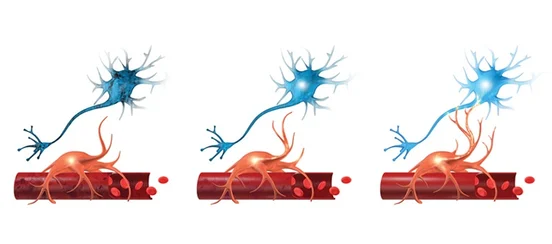
In most cases, PCS symptoms are caused by a combination of one or more of the following common causes:
Neurovascular Coupling (NVC) Disruption
The brain may only comprise 2% of body weight, but it uses about 20% of the body’s energy. This high energy demand is met by a consistent supply of energy and oxygen delivered by an extensive network of blood vessels.
In a healthy brain, nerve cells “request” the resources they need to perform a particular task, which surrounding blood vessels deliver at the right time and to the right place. This dynamic connection is called neurovascular coupling (NVC) and is key to maintaining healthy brain function.
Concussions, however, affect normal blood flow and cause neurovascular “uncoupling.” In other words, neuron clusters in some areas might not receive enough resources to complete their tasks. Or, they might receive too many resources — with the wrong timing (wasting precious resources and burning out the brain more quickly). When one pathway fails, the brain will try to find an alternative pathway, but it’s inevitably less efficient and will tire the brain. This results in a variety of symptoms, such as headaches, feeling overwhelmed, and irritability.
Depending on which areas are most affected, patients may experience additional symptoms. For example, if the concussion affected areas of the brain involved with memories, patients may struggle with long-term or short-term memory. If it affected parts of the brain involved with vision, patients may experience altered peripheral vision or blurry vision.
Dysfunction of Autonomic Nervous System (ANS)
Concussions also affect the autonomic nervous system (ANS).
The ANS regulates vital body functions, such as heart rate, blood pressure, gastrointestinal movements, body temperature, and breathing rate. The ANS includes two subsections called the sympathetic nervous system (SNS) and the parasympathetic nervous system (PNS). In simple terms, the SNS regulates our “fight or flight” response, while the PNS is responsible for our “rest and digest” systems. In a healthy person, both sections work together in harmony.
In PCS patients, however, the SNS stays “in charge” most of the time. This constant overactivation changes the way the ANS communicates with different parts of the body — e.g., lungs, stomach, heart. Each specific organ continues to function, but its capacity to respond to changing conditions will be severely compromised. As a result, patients experience a series of symptoms such as fatigue, headaches, high blood pressure, digestive issues, problems sleeping, mood changes, and more.
Further reading: Autonomic nervous system dysfunction after a TBI
Hormonal Dysfunction
Concussions can affect two places in the brain that are responsible for governing most of our hormones: the pituitary gland and the hypothalamus. They indirectly regulate multiple mechanisms in the body, from digestion to fertility. As such, hormone imbalances triggered by a concussion can cause a myriad of symptoms, including:
- Depression
- Anxiety
- Chronic muscle pain
- Fatigue
- Digestive issues
- Weight loss or weight gain
- Sexual dysfunction
- Fertility issues
- Irritability
- Anger
- Sleep disturbances
- Mood swings
- And more
Further reading: Post-concussion hormone dysfunction
Vision Problems
Vision depends on the brain’s ability to receive and accurately interpret the images sent by the eyes. Anything that affects the eyes, the brain, or the way they communicate with each other impacts our ability to see correctly.
After a concussion, patients may experience changes in focusing, eye teaming (how eyes work together), depth perception, eye tracking, and peripheral vision. These issues can cause blurred or double vision, sensitivity to light, vision loss and eye pain among others. In turn, these symptoms can result in other complications such as dizziness, poor balance, as well as difficulty reading or concentrating.
Vestibular Dysfunction
Vestibular dysfunction can also lead to PCS symptoms.
The vestibular system — located in the inner ears — controls balance and helps the brain understand where the body is in space. Trauma to the brain can disrupt this connection and can lead to dizziness, poor posture, instability when walking, fatigue, and difficulty performing routine daily activities.
Breathing Dysregulation
Concussions can disrupt the communication between the brain and lungs. When the brain can’t react with accuracy and precision to cover what the body needs, patients may suffer breathing disturbances, including shortness of breath, irregular breathing, dizziness, and fatigue.
Further reading: Can PCS cause breathing difficulties?
Treating the Long-Term Effects of a Concussion
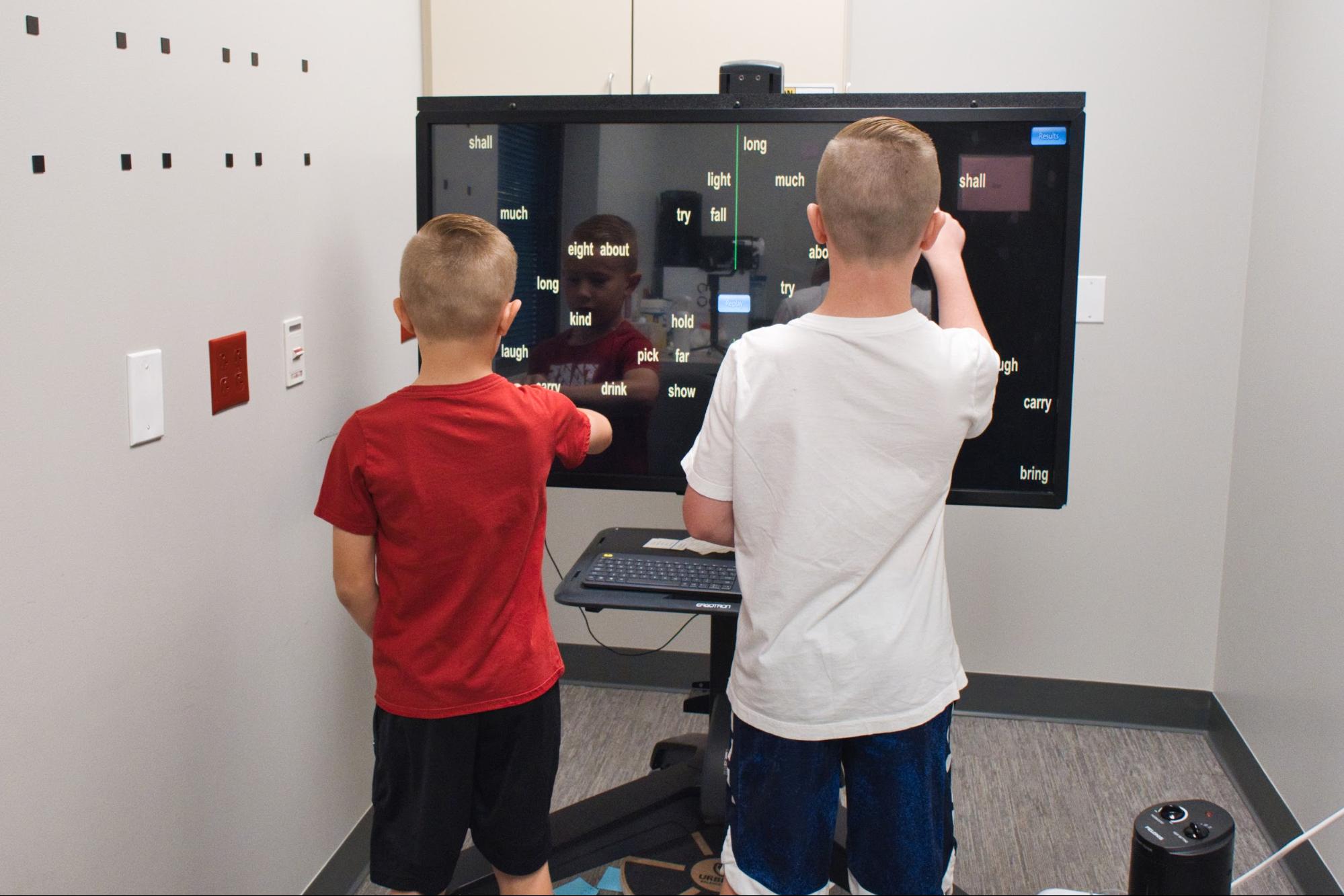
Before treatment starts at Cognitive FX, our team assesses each patient’s medical history, symptom profile, and physical, cognitive, and psychological well being.
This includes:
- Physical performance including reflex response, balance, hand-eye coordination, and so forth
- Cognitive abilities such as memory, thinking, executive function, and problem-solving skills
- Emotional status, including signs of anxiety, depression, or other mental health conditions
Patients also go through a brain imaging scan to determine how and where the concussion affected their brain. This scan, called functional NeuroCognitive Imaging (fNCI), assesses about 100 different areas in the brain and how those regions communicate with each other while the patient carries out a series of standardized cognitive tasks.
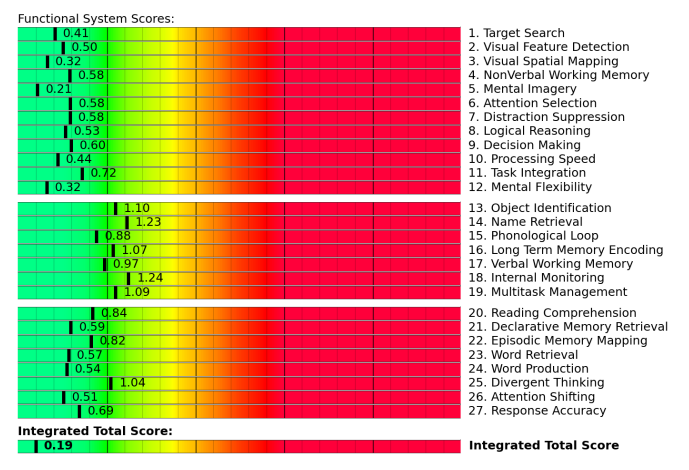
fNCI results from a patient with healthy neurovascular coupling. Scores in the yellow and red zone often indicate poor NVC.
Combining all of this information allows our team to design a customized treatment plan to target the areas in the brain that were most affected by the concussion.
During treatment, patients go through a three-step cycle that is repeated several times a day: Prepare, Activate, and Recover. Overall, the goal is to restore normal neurovascular coupling, recover normal ANS function, and reduce the incidence and severity of PCS symptoms.
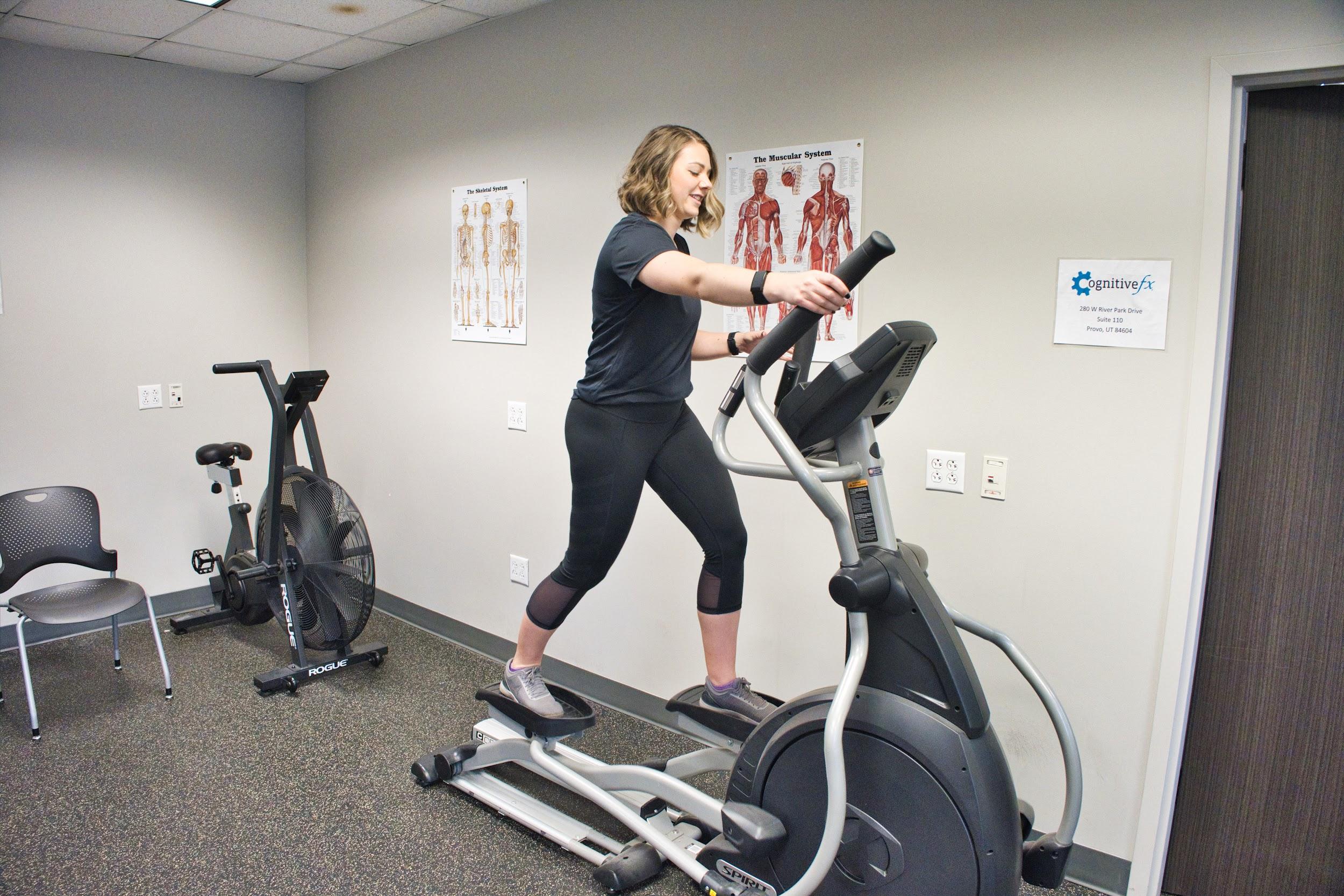
Prepare: Typically, sessions start with a period of aerobic exercise (usually on a treadmill or stationary bike) to take advantage of a phenomenon in the brain called post-exercise cognitive boost (PECB). PECB triggers the release of chemicals in the brain, including a compound called brain-derived neurotrophic factor (BDNF). BDNF promotes the growth of brain cells and improves communication between different areas of the brain. In turn, this helps the patient's brain become more flexible and boosts the effect of subsequent therapy.
Patients who struggle with physical activity still make remarkable progress in these sessions. Our therapists are trained to work around exercise intolerance and to help patients recover without triggering severe symptoms.
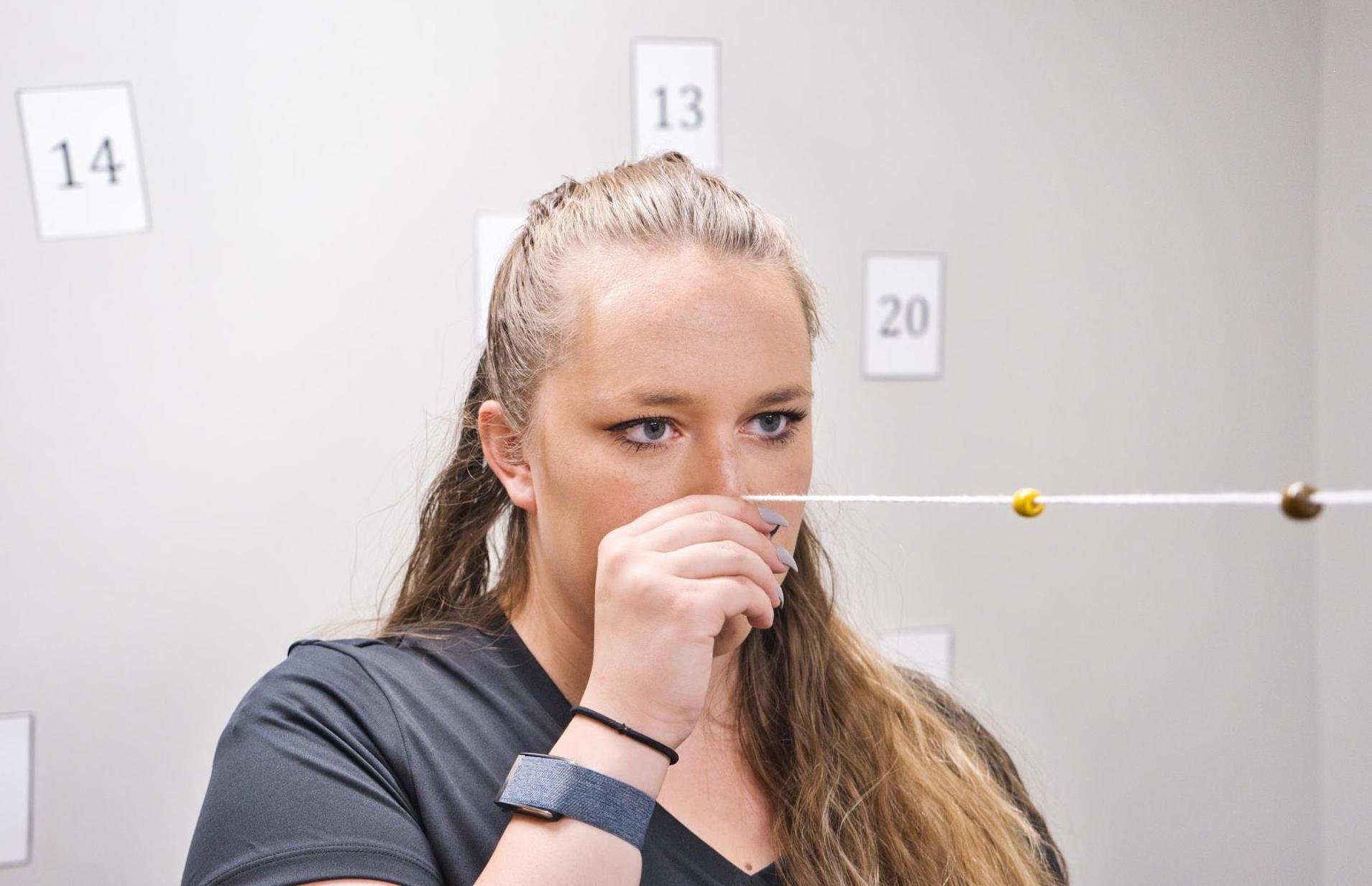
Activate: After exercise, patients attend a variety of therapies, including:
- Cognitive therapy
- Sensorimotor therapy
- Neuromuscular therapy
- Dynavision therapy
- Occupational therapy
- Neurointegration therapy
- Vision and vestibular therapy
- Psychotherapy
- And more
Most patients receive all or most of these therapies during their visit, but the exact regimen for each person is unique to them. Many sessions often include cross-disciplinary exercises.
For example, our therapist may ask you to balance on a Bosu ball, toss color-coordinated tennis balls back and forth, and name an animal for each letter of the alphabet, all at the same time. This forces your brain to activate areas involved in balance, hand-eye coordination, and word recall, while encouraging healthy neurovascular coupling.
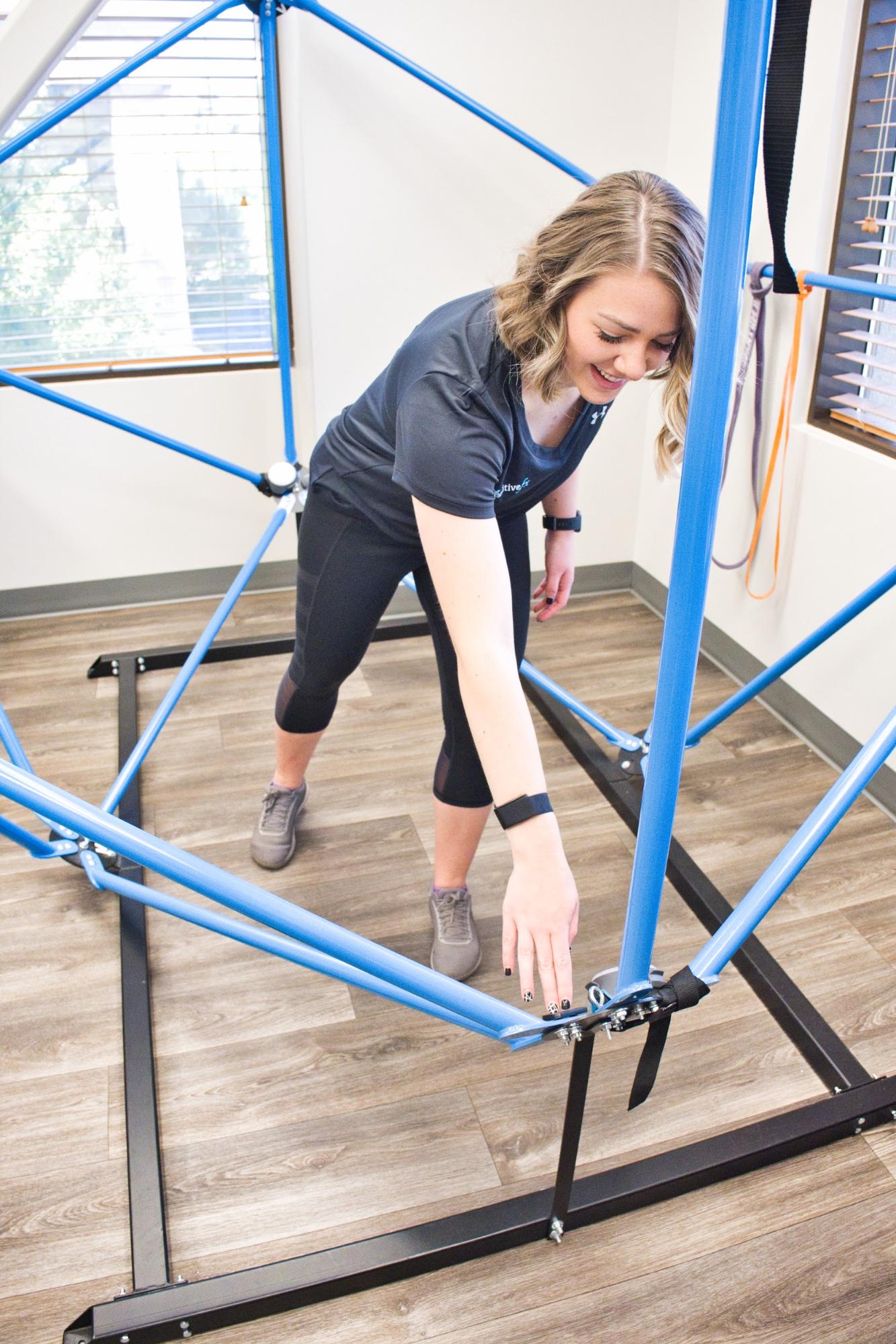
Rest: The last step involves activities to help patients relax and rest in between therapies. This may include neuromuscular massage of the neck and shoulders, breathing and mindfulness exercises, and listening to Brainwaves (which work in a similar way to meditation).
At the end of treatment, patients also undergo a second scan to check on the progress they’ve made. Then, they meet with one of our therapists to go over their results and receive a series of exercises to do at home. This homework typically includes physical exercises, cognitive activities, visual and vestibular exercises, and relaxation techniques. We recommend that patients do these exercises for about an hour five times a week at first, but this frequency can be gradually reduced as symptoms improve. For patients who need further therapy, we also recommend suitable specialists.
To determine if our program is right for you, please schedule a consultation with our team.
Frequently Asked Questions (FAQ)

What can I do at home to help with my recovery?
Living with PCS can be challenging. Symptoms often get in the way of anything that requires you to use your brain. School, work, and even social activities can become a struggle.
We suggest a few ways to make your daily life more manageable. Patients with PCS experience different symptoms, so not all of these suggestions may be suitable for you.
- Safely engage in post-concussion exercise (link includes instructions for those who are exercise intolerant).
- Follow a good post-brain injury nutrition plan.
- Follow healthy sleep hygiene.
- Rest your brain regularly during the day.
- Return to normal activities gradually. If you start experiencing unbearable symptoms again, stop and try again in a few days.
- Engage in activities to challenge the brain gently.
- Try our post-concussion headache recovery course.
Can concussions cause problems years later?
Yes, a previous concussion can cause symptoms years later. Some symptoms develop immediately after the concussion and last for months or years after the original injury, while others may emerge later. Some concussion effects, such as autonomic dysfunction, can spiral into additional symptoms that arise years later, such as depression, food sensitivities, or feeling unusually hot or cold.
What are the effects of multiple concussions?
While scientists are conflicted about whether multiple concussions are a risk factor for long-term symptoms, every concussion is an opportunity to develop worse or longer effects. PCS is not necessarily more severe if you’ve suffered more than one, but it can be. For example, Cognitive FX patients Olivia Seitz and Chris Nicastro both suffered from long-term effects after multiple concussions. But both made significant recoveries once they received proper treatment at our clinic.
Can a concussion cause permanent problems?
Without treatment, post-concussion syndrome is often permanent. However, it can resolve or improve with the right therapy. Patients with underlying factors — such as cervical spine issues, damaged brain tissue, and so forth — have an increased risk of long-term symptoms and may face more challenging recoveries.
In one of our published research articles, we collected and analyzed data from 270 concussed patients. We were able to confirm the effectiveness of the fNCI-based evaluation and treatment of post-concussion syndrome.
Patients who underwent four days of EPIC Treatment demonstrated significant improvement in both objective and subjective data. On average, patients improved by 75% on the severity index score (severity of the dysregulation of blood flow in the brain). Of the 270 concussed patients, 62% percent of the patients reported an improvement of their post-concussion symptoms after those four treatment days.
Today, those outcomes have improved as we’ve continued to refine our treatment program. Over 90% of our patients experience symptom improvement. Many of our patients continue to report decreased symptoms and increased quality of life over time.
What can a neurologist do for post-concussion syndrome?
In a survey of 289 neurologists attending a 2017 Texas Neurological Society meeting, the majority of neurology professionals who responded said they didn’t believe effective treatment was available for post-concussion syndrome. The unfortunate reality is that many neurologists have not received training on PCS or its treatment. Of those who are aware of the condition, most prescribe medications which may help, but often fail to make a difference — or that can even make symptoms worse.
That’s not to say that the right neurologist can’t help you. For more information on this nuanced topic, please see our article on what a neurologist can do for post-concussion syndrome.
Do children with post-concussion syndrome need different treatment protocols?
Adolescents and children who sustain concussions benefit from largely the same treatment protocols as adults, although certain exercises may need to be modified to be age-appropriate. Discerning the signs of post-concussion syndrome in children is more challenging than in adults if you aren’t sure if they’ve injured their heads. Pediatric doctors may or may not be well trained in diagnosis.
Read more in our article about identifying and treating PCS in children.
I received treatment at a local clinic after the original injury, but I’m still struggling with some symptoms. What should I do?
Sometimes, acute concussion treatment does not resolve all symptoms. Some patients experience slowly worsening symptoms and/or new symptoms. Others simply don’t find relief after trying their local clinic.
If that’s the case, it’s important to find medical professionals who specialize in post-concussion syndrome (PCS) and who have the multidisciplinary treatment capabilities needed to promote recovery. At Cognitive FX, we have the best treatment center for the long-term effects of concussion in the world. To discuss your options with our team, schedule a consultation.

About the author
Dr. Mark Allen, Ph.D.Dr. Mark D. Allen holds a Ph.D. in Cognitive Science from Johns Hopkins University and received post-doctoral training in Cognitive Neuroscience and Functional Neuroimaging at the University of Washington. As a co-founder of Cognitive Fx, he played a pivotal role in establishing the unique and exceptional treatment approach. Dr. Allen is renowned for his pioneering work in adapting fMRI for clinical use. His contributions encompass neuroimaging biomarkers development for post-concussion diagnosis and innovative research into the pathophysiology of chronic post-concussion symptoms. He's conducted over 10,000 individualized fMRI patient assessments and crafted a high-intensity interval training program for neuronal and cerebrovascular recovery. Dr. Allen has also co-engineered a machine learning-based neuroanatomical discovery tool and advanced fMRI analysis techniques, ensuring more reliable analysis for concussion patients.
